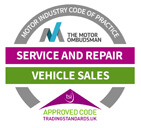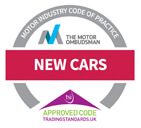Your current car often plays a key role in being able to afford a new one. The most obvious route is to sell your current car and use the money towards your future purchase, but, when buying from a dealership, there’s also the option to part-exchange your vehicle as part of a new car deal.
Part-exchanging is a hugely popular solution for car buyers, however, if you’re not familiar with the process, you might be wondering why you would do it rather than selling your vehicle. Below, you’ll find all the basics you need to know about part-exchange cars, whether it’s worth it for you and how the process tends to work, so you know which direction to head in when it comes to buying a new car.
What is part-exchanging?
Part-exchanging, or “part ex-ing” your car is an alternative way of selling your car as part of a deal that helps you pay for a new one. Part ex-ing is best thought of as a trade-in of your current vehicle and is typically utilised to “trade up” to a more expensive model.
You’ll find virtually every established dealership out there offers part exchange as an option to its customers. As a general rule, part exchange is seen as the easy option to sell your car, giving you a quick, hassle-free, reliable and sure-fire seller method that avoids the potentially drawn-out process that comes with selling your car privately.
How does part-exchange work on a car?
The part-exchange process is fairly simple. Once you and your dealer have agreed a value for your vehicle, that figure is subtracted from the price of your new car and you pay the difference. If you’re doing a simple trade-in of an owned used vehicle for a new purchase, that’s all there is to it.
How does part-exchanging a car on finance work?
If you have your current car as part of a personal contract purchase (PCP) deal, you have three options available to you at the conclusion of your contract. The first is to return the car with nothing more to pay, the second is to buy it for a final, one-off price, and the third is to part-exchange the vehicle and get a different car on a new finance deal.
In this third instance, you can often use equity from your old finance deal against a new one – this is because PCP deals are typically structured so your car is worth more than the optional one-off payment at the end of the deal. So, if you’ve looked after your car throughout your PCP contract, it should hold some part-exchange value to help you get a new one.
Is it worth part-exchanging my car?
The big question of “should I part-exchange my car?” really boils down to your priorities when selling. If it’s a question of maximising sale value, or you’re not looking to get a new car, then you might be better off selling privately. However, if you’re looking for simplicity, speed and reliability, or for value against a particular vehicle, then part-exchange makes a lot of sense.
Reasons to part-exchange my car
· Speed: You can go down to a dealership today and agree a part-exchange deal on your current vehicle.
· Simplicity: Part-exchanging your car is a hassle-free way of selling. No need to worry about speaking to and hosting would-be buyers or dealing with any of the palaver attached to selling yourself.
· Put your car towards a new deal: Whether you’re buying on finance or outright, part-exchanging allows you to carry out an effective two birds, one stone strategy, where your old car is sold and a new car is bought in one, easy process.
Reasons to sell my car privately
· Sale value: If you want to get the absolute maximum value from your sale, in all likelihood you’ll find it in a private listing over a dealership sale or part ex. That’s not to say you won’t get a fair price from a dealer, but selling privately allows you to set a price on your terms that isn’t concerned with margins or targets.
· If you’re selling only: If you don’t want to get a new car by trading in your old one – say, for example, if you’re just selling a second car you won’t be replacing – then naturally a sale is the only sensible option.
With sale value the only real benefit to selling privately, part-exchange has become a hugely popular option, with 3.2m buyers each year choosing to go down the part-ex route rather than set up a private listing.
How much is my car worth in part exchange?
Part-exchange car value is defined by a number of factors, with valuations based on industry data from companies dedicated to second-hand car valuation. All the usual factors that go into defining a car’s value, such as its condition, mileage, age, service history and specifications, will be taken into account when arriving at a number.
If you want an idea of how much your car is worth, use our free car valuation tool to find out. It’s simple and quick to use and will present you with a number of options going forward for a potential sale or part ex.
What is the best way to part-exchange my car?
Whether you’re looking to part-exchange your car on finance or make an outright purchase using part-ex as a difference-maker, there’s really not much secret to doing it the right way.
We’d recommend you find a reliable part-exchange car dealer that you trust, shop around for the best deal and only agree to complete a deal when you’ve got a price you think is fair and are satisfied with. As long as you understand your car’s value and the process behind part-ex before you head into a deal, there’s not too much more to worry about, hence why it’s such a popular selling method.
What do I need when part-exchanging my car?
There are a few key documents you need to part-exchange your car:
· Your car’s V5C – otherwise know as your logbook.
· Your original receipt of purchase from when you bought your current vehicle, which will offer the dealer all the key information they need.
· A valid MOT certificate.
· The original owner’s manual.
· A full-service history, which will help get you the best part-ex price possible.
Should I MOT my car before part-exchanging?
As stated above, you’ll need a valid MOT certificate as part of your essential documents. As for timings, the more recent MOT you have, the better when it comes to getting more bang for your buck on the deal.
Should I clean my car before part-exchanging?
Cleaning your car before a part exchange definitely isn’t a requirement, but it certainly won’t do you any harm. First impressions count, as does the condition of your vehicle during a value assessment. A dirty car could, for example, damage your valuation because the dealer can’t see the true condition of the body and paintwork.
It’s common sense to clean your car before any potential sale, so a part exchange should really be no different.
Where can I find a part-exchange car dealer near me?
It certainly won’t be too hard to find yourself a dealer that does part exchange nearby, as already mentioned it’s about finding one that you trust. At Stellantis &You UK, we offer a variety of attractive part-exchange options and can offer expert, fair valuations as well as a speedy, efficient and hassle-free selling and buying process to all customers.


 Find us
Find us
 Contact Us
Contact Us


 My account
My account













